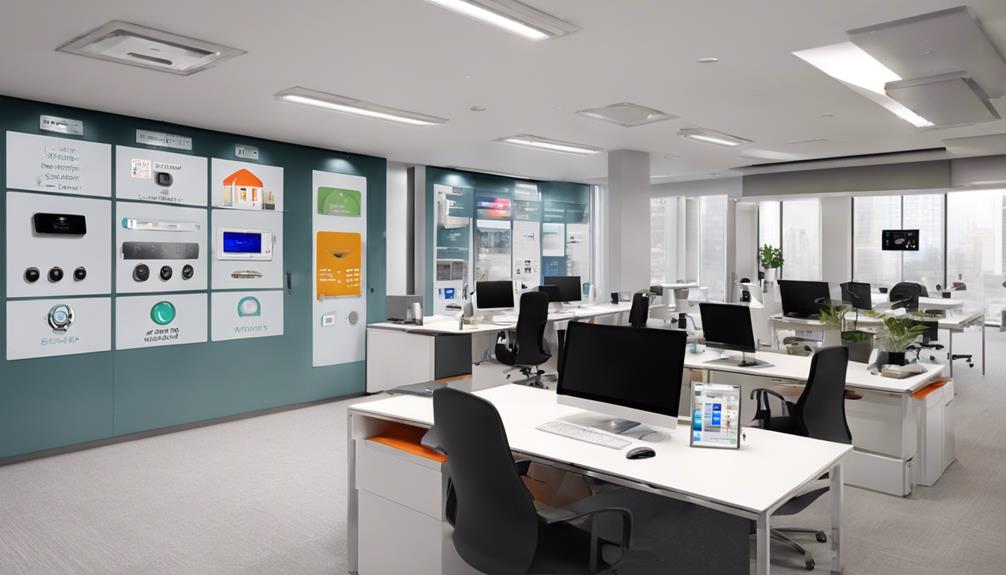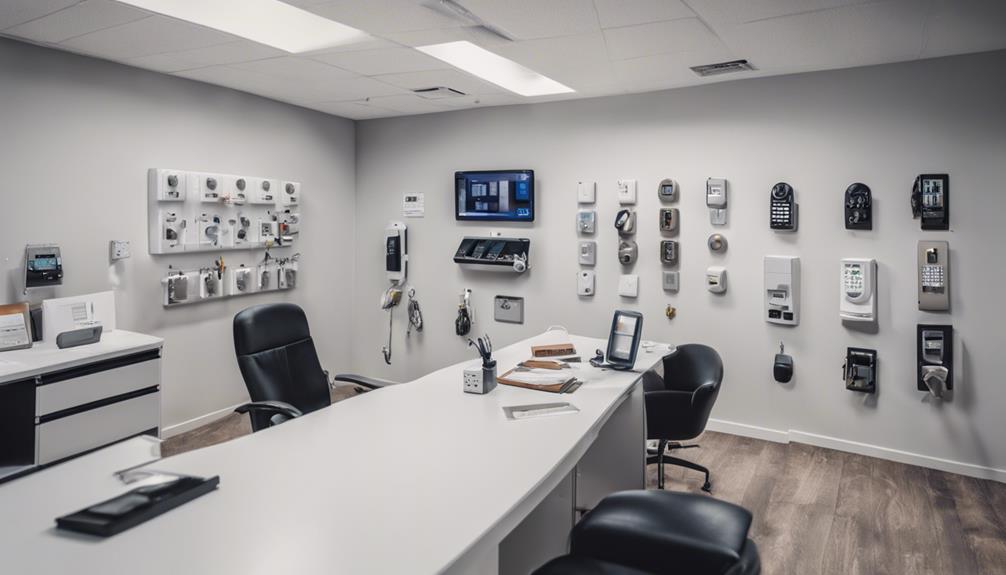Did you know that nearly 70% of businesses report improved communication after upgrading their intercom systems? Choosing the right intercom can greatly enhance your operations, but with various types available—wired, wireless, audio, and video—it can be overwhelming. Each option has its own set of advantages and features tailored to different business needs. Understanding what each system offers and how to assess your specific requirements is essential for making an informed decision that suits your business environment. So, what factors should you consider to guarantee you select the best intercom system for your needs?
Key Takeaways
- Identify whether a wired or wireless intercom system suits your business needs based on reliability, audio quality, and installation preferences.
- Evaluate audio and video intercom options, considering sound clarity, video quality, and integration with existing security systems.
- Assess the size and layout of your facility to determine the number of intercom units required for effective communication.
- Consider user requirements like mobility and scalability to ensure the system can adapt to future business growth.
- Seek professional installation services for optimal system performance, security, and ongoing support to maintain functionality.
Overview of Intercom Systems

Intercom systems serve as essential communication tools in commercial settings, enhancing both safety and operational efficiency. Understanding intercom history reveals how these systems evolved from rudimentary devices to sophisticated intercom technology that supports diverse business needs. Initially designed for basic communication, intercoms now integrate advanced features such as video capability, wireless connectivity, and mobile integration. This evolution addresses the increasing demand for streamlined communication in fast-paced environments. You'll find that modern intercom systems not only facilitate instant communication but also enhance security by controlling access and monitoring premises. As you consider implementing an intercom system, focus on how its technological advancements can bolster your operational capabilities and guarantee a seamless communication experience within your organization. Additionally, guaranteeing seamless communication within your organization can enhance access control with expert intercom solutions.
Types of Commercial Intercoms
When choosing an intercom system for your commercial needs, understanding the differences between wired and wireless options is essential. Wired intercom systems typically offer more reliability and better audio quality, while wireless systems provide flexibility and easier installation. Both types have distinct advantages, so evaluating your specific requirements will help you make an informed decision.
Wired Intercom Systems
Wired intercom systems provide a reliable and efficient means of communication for commercial environments, enhancing connectivity across various settings. One of the key advantages of wired systems is their stability; they offer superior sound quality and reduced interference compared to wireless alternatives. When considering intercom installation, you'll find that wired solutions often require less ongoing maintenance and provide a longer lifespan, making them a cost-effective choice over time. Additionally, wired systems are less susceptible to hacking, ensuring your communications remain secure. For businesses with high traffic areas or multiple buildings, these systems facilitate seamless interaction among personnel, thereby boosting operational efficiency and responsiveness. Ultimately, investing in a wired intercom system empowers your organization with robust communication capabilities. Additionally, integrating advanced features such as biometric access control can further enhance the security and efficiency of your business operations.
Wireless Intercom Systems
Many businesses are turning to wireless intercom systems for their flexibility and ease of installation, making them an attractive option for commercial use. Utilizing advanced wireless technology, these systems eliminate the need for extensive wiring, allowing for quick setup and relocation as your business evolves. They enhance communication efficiency, enabling seamless conversations across various departments without the constraints of traditional systems. Wireless intercoms also support features like interconnectivity with mobile devices, enhancing accessibility for employees on the go. When choosing a wireless system, consider factors such as range, battery life, and compatibility with existing technologies to guarantee it meets your operational demands. This strategic investment empowers your workforce and streamlines internal communication, driving productivity and effectiveness.
Audio Intercom Systems

When choosing an audio intercom system, you'll want to evaluate key features that meet your specific needs, such as sound quality and range. You'll also need to weigh the benefits of wired versus wireless options, as each has its advantages depending on your environment. Finally, think about how well the system can integrate with other technologies you already use, ensuring seamless communication throughout your commercial space.
Key Features to Consider
Choosing the right audio intercom system for commercial use requires careful consideration of several key features that can greatly impact communication efficiency and user experience. First, assess the sound quality and clarity; superior audio guarantees messages are delivered without miscommunication. Businesses can benefit from enhanced communication through crystal-clear sound transmission. Next, consider user preferences regarding functionality, such as ease of use and volume control. This can enhance overall satisfaction among employees. Additionally, evaluate the installation costs; some systems may require extensive wiring, while others may offer simpler setups that save you money. Finally, think about scalability. As your business grows, your intercom system should adapt to increased communication needs without requiring a complete overhaul. Prioritizing these features will empower you to make an informed decision for your organization.
Wired vs. Wireless Options
Deciding between wired and wireless audio intercom systems can greatly influence your communication strategy in a commercial setting. Wired systems often offer increased reliability and enhanced security features, making them ideal for high-security environments. However, wireless systems provide flexibility and easier installation, particularly in older buildings where running cables may be impractical.
| Factor | Wired | Wireless |
|---|---|---|
| Installation | Complex, may require professionals | Simple, DIY-friendly |
| Reliability | Highly reliable | Susceptible to interference |
| Security Features | Strong, less vulnerable | Variable, requires robust protocols |
Consider intercom maintenance tips for both systems to ascertain longevity and security. Your choice should align with your business needs, balancing functionality and security.
Integration With Other Systems
Integrating audio intercom systems with other technologies can markedly enhance communication efficiency in commercial environments. By considering cloud integration, you can streamline communication across various platforms, allowing for real-time updates and improved operational workflows. System compatibility is essential; guarantee your intercom can seamlessly connect with existing security systems, VoIP phones, and management software. This integration not only boosts productivity but also provides a unified interface for all communication needs. When selecting an audio intercom system, prioritize options that offer robust APIs and support for third-party applications. This foresight in planning will empower your business with a cohesive communication strategy, ultimately leading to more effective collaboration and decision-making across your organization.
Video Intercom Systems
Video intercom systems have become essential tools for enhancing communication and security in commercial environments. These systems provide real-time video feeds, allowing you to visually verify visitors before granting access. When choosing a video intercom system, consider the following key factors:
- Video Quality: High-definition video guarantees clear images, which is vital for security and identification. Additionally, having a high-quality video feed can help in identifying potential security threats.
- Installation Options: Evaluate whether you prefer wired or wireless systems, as each has distinct benefits and challenges.
- Integration Capabilities: Confirm your system can seamlessly integrate with existing security measures and communication platforms.
Wireless Intercom Solutions

As businesses increasingly prioritize flexibility and ease of use in their communication systems, wireless intercom solutions have gained popularity in commercial settings. These systems eliminate the constraints of wiring, allowing you to communicate seamlessly across expansive areas. When considering a wireless solution, pay attention to wireless range; some models offer extensive coverage, while others may be limited. Additionally, be mindful of potential signal interference from other devices, which can disrupt communication. Selecting a reliable system with robust signal strength will minimize these issues. Ultimately, investing in a high-quality wireless intercom can enhance your operational efficiency, facilitating real-time communication and collaboration among your team, regardless of their location within your premises.
Wired Intercom Options
For many businesses, wired intercom options remain a reliable choice for secure and consistent communication. When considering wired systems, you'll find a variety of solutions tailored to different needs:
- Analog intercom options: These systems provide straightforward, cost-effective communication without the complexities of digital technology.
- Digital intercom solutions: Offering superior sound quality and advanced features, digital systems enhance communication efficiency and scalability.
- Hybrid systems: Combining both analog and digital technologies, these systems provide flexibility and allow for gradual upgrades.
Features to Consider

When evaluating intercom systems, identifying key features can greatly impact your communication efficiency and overall satisfaction. First, consider the audio and video quality; high-definition capabilities can enhance clarity during conversations. Next, think about integration options with existing security systems or software to streamline operations. Cost considerations are crucial—ensure the system fits within your budget while still delivering essential functionalities. Additionally, installation requirements can vary; some systems may need extensive wiring, while others offer easy plug-and-play solutions. Reviewing these features will empower you to make an informed decision, ensuring the intercom system you choose aligns with your business's specific needs and enhances your operational effectiveness. Prioritize features that promote reliability and ease of use for your team.
Assessing Your Business Needs
Evaluating your business needs is crucial for selecting the right intercom system that aligns with your operational goals. To enhance business communication and boost operational efficiency, consider these key factors:
- Size and Layout: Assess your facility's size and arrangement to determine the number of intercom units required. Advanced intercom technologies, like IP-based systems, offer scalability for businesses of various sizes.
- User Requirements: Identify the specific needs of your staff, such as mobility or the need for video capabilities. Wireless intercom systems provide flexibility for varied business environments.
- Integration: Consider how the intercom system will integrate with existing technologies, like security systems or telephony. Tailored plans guarantee compatibility and effective integration of intercom systems.
Low Rate Locksmith's Installation Services

Many businesses find that professional installation services are vital for ensuring their intercom systems operate at peak efficiency. Low Rate Locksmith specializes in providing locksmith security solutions tailored to your specific needs. Their team of experts understands the intricacies of intercom systems and can guide you through essential intercom installation tips to enhance your security infrastructure. By choosing a professional service, you minimize risks associated with improper installation, ensuring ideal functionality and reliability. Additionally, their competitive pricing allows you to invest in high-quality solutions without breaking the bank. In an age where security is paramount, partnering with Low Rate Locksmith can empower your business to operate smoothly while safeguarding your assets with advanced intercom technology.









